18 Home Remedies To Relieve Constipation During Pregnancy + Causes And Foods To Eat
Improve bowel movements and manage constipation during pregnancy with these natural laxatives.

Image: Shutterstock
Becoming pregnant is one of the most amazing and blessed experiences in your life, but it also comes with its share of difficulties. Morning sickness, abdominal pain, and infrequent bowel movements are common during pregnancy. The hormonal changes in your body and the kind of food you eat during this time may affect your bowel movements, leading to constipation. Understanding why constipation occurs during pregnancy is important to learn how to manage the condition effectively. By recognizing these causes, pregnant people can make better choices for their health and overall well-being. In this article, we explore a couple of home remedies for constipation during your pregnancy you can try to get relief from this tiring ordeal.
In This Article
How To Treat Constipation During Pregnancy Naturally
Constipation during pregnancy can be uncomfortable, but there are many home remedies that can help alleviate symptoms and promote digestive health.
Disclaimer: Consult your doctor before trying any of these home remedies. It is not recommended to take regular doses of ingredients like isabgoli , peppermint, or apple cider vinegar during the first 20 weeks of pregnancy.
1. Lemon

Lemon exhibits antioxidant properties due to the presence of vitamin C (1). This increases the production of bile in the body. This, in turn, may help in treating constipation.
You Will Need
- 1/2 lemon
- 1 glass of warm water
- Honey (optional)
What You Have To Do
- Squeeze half a lemon into a glass of warm water.
- Add honey to taste and consume this daily.
How Often You Should Do This
Do this 1-2 times a day.
Caution
Drinking highly concentrated lemon juice may irritate the stomach lining, leading to heartburn (2). It is best to mix it with warm water.
2. Oranges
Oranges are excellent sources of dietary fiber (2). Dietary fiber may help increase stool frequency in individuals with constipation (3).
You Will Need
1-2 oranges
What You Have To Do
Have an orange or two on a daily basis.
How Often You Should Do This
Do this once a day.
3. Prune Juice
Prunes contain a compound called sorbitol (4). This compound exhibits laxative properties (5). Hence, consuming prunes or prune juice for constipation may effectively treat this condition.
You Will Need
1 cup of prune juice
What You Have To Do
- Consume a cup of prune juice.
- Alternatively, you can also eat prunes instead of drinking the juice.
How Often You Should Do This
Do this at least 4 times a day.
4. Flaxseeds
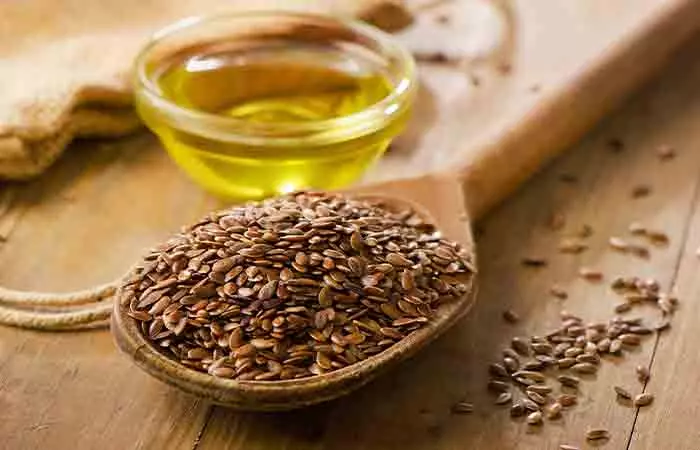
Research suggests that flaxseeds exhibit laxative properties (6). These properties may help in relieving constipation.
You Will Need
1/2-2 tablespoons of pre-ground flaxseeds
What You Have To Do
- Consume half a tablespoon of ground flaxseeds via your daily diet.
- Gradually increase the intake to two tablespoons.
How Often You Should Do This
Do this once a day.
Note: Drink ample amounts of water while including flax seeds in your diet.
5. Ispaghula Husks
Ispaghula husk (psyllium) is a rich source of dietary fiber (7). When mixed with water, it acts as a mild laxative and helps to soften the stool (8). This may help in relieving constipation and its symptoms.
You Will Need
- 1 sachet of ispaghula husks
- 1 glass of water
What You Have To Do
- Add one sachet of ispaghula husk granules to a glass of cold water.
- Mix well and consume this immediately.
How Often You Should Do This
Do this 2 times a day.
Caution
Psyllium exhibits impressive water absorption capacity and expands (10). So, inadequate fluid intake can lead to intestinal blockage or worsening constipation. This is a serious concern; hence, always drink at least 1 to 2 glasses of water with it.
6. Lemon Or Peppermint Essential Oil
Aromatherapy massage using peppermint or lemon essential oil may help soften fecal impactioni A condition in which a hard lump of stool gets trapped in the rectum or lower colon and cannot be removed due to constipation. and treat constipation (9).
You Will Need
- 1-2 drops of lemon/peppermint essential oil
- 1 teaspoon of any carrier oil (olive or almond oil)
What You Have To Do
- Mix the essential oil with a carrier oil of your choice.
- Massage this mixture on your abdomen.
How Often You Should Do This
Do this once a day.
7. Kiwi Fruit
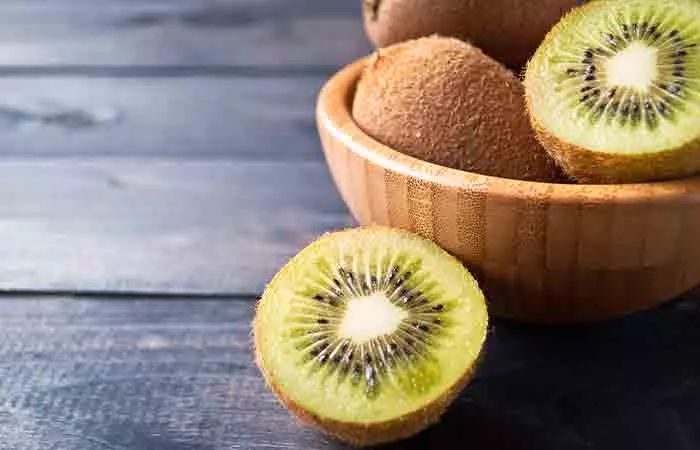
Kiwis have high water and dietary fiber content (10). This may get the bowels moving and functioning smoothly (11), (12). This may make kiwi one of the best remedies for constipation.
You Will Need
1 kiwi
What You Have To Do
Have a kiwi daily.
How Often You Should Do This
Do this once a day.
 Did You Know?
Did You Know?8. Vitamin C
Vitamin C exhibits laxative activity (13). Hence, it may be suitable for the treatment of constipation. Consuming citrus fruits and juices may help in treating constipation.
Note: Consult a doctor before taking additional vitamin C supplements as the vitamin C intake should not exceed 6000 mg daily for pregnant women.
9. Yogurt
Yogurt is a rich source of probiotics that aid digestion by altering the microbiotai A system or range of microorganisms that reside in a defined environment inside all multicellular organisms. in the bowels (14). This may help in treating constipation in pregnant women.
You Will Need
1 cup of plain yogurt
What You Have To Do
Consume a cup of plain yogurt.
How Often You Should Do This
Do this once a day.
10. Apple Juice
Apples contain a naturally occurring fiber called pectin. It is one of the best juices for constipation and its fiber promotes bowel movements (15). Hence, it may help in treating constipation.
You Will Need
- 1 apple
- 1 cup of warm water
What You Have To Do
- Cut an apple into small pieces and blend it with a cup of warm water.
- Consume this juice.
Tip: Do not peel the apple.
How Often You Should Do This
Do this once a day.
11. Apple Cider Vinegar

Anecdotal evidence suggests that the acetic acid present in apple cider vinegar may improve digestion. However, there is no scientific evidence to back this claim.
You Will Need
- 1 tablespoon of apple cider vinegar
- 1 tablespoon of honey
- 1 glass of warm water
What You Have To Do
- Add a tablespoon each of honey and apple cider vinegar to a glass of warm water.
- Mix well and consume this solution.
How Often You Should Do This
Drink this every morning and night until you see an improvement in your condition.
12. Coconut Oil
coconut oil contains medium-chain fatty acids that boost metabolism (16). This may help in stimulating bowel movement.
You Will Need
1-2 tablespoons of coconut oil
What You Have To Do
- Consume a tablespoon of coconut oil on a daily basis.
- You can either add it to your salads or consume it directly.
How Often You Should Do This
Do this 2 times a day.
13. Chia Seeds
Chia seeds are rich sources of dietary fiber (17). This fiber aids bowel movement. Hence, chia seeds may help in treating constipation.
You Will Need
- 1 1/2 tablespoons of chia seeds
- 1 cup of juice or milk
What You Have To Do
- Let the chia seeds soak in water for 30 minutes.
- Add the soaked chia seeds to your favorite drink and have it.
How Often You Should Do This
Do this once a day.
 Did You Know?
Did You Know?14. Cranberry Juice
Cranberries are a good source of dietary fiber (18). This may make cranberry an effective natural remedy for constipation.
You Will Need
1 glass of unsweetened cranberry juice
What You Have To Do
Consume a glass of cranberry juice.
How Often You Should Do This
Do this once a day.
15. Epsom Salt
The magnesium sulfate present in Epsom salt exhibits laxative action (19). This may aid in treating constipation.
You Will Need
- 1 cup of Epsom salt
- Water
What You Have To Do
- Add a cup of Epsom salt to your bath.
- Soak and relax in it for 15 to 20 minutes.
How Often You Should Do This
Do this at least 3 times a week.
Note: Since Epsom salt draws water into the intestines, drinking plenty of fluids is essential to prevent dehydration.
16. Green Tea

The caffeine present in green tea exhibits mild laxative properties (20). This may aid in relieving constipation.
You Will Need
- 1 teaspoon of green tea leaves
- 1 cup of water
- Honey (optional)
What You Have To Do
- Add the green tea leaves to a cup of hot water and a
- Allow them to steep for 5 to 10 minutes.
- Strain and consume the tea before it turns cold.
- You can also add honey for flavor.
How Often You Should Do This
Do this 1-2 times a day.
17. Grapes
Grapes are rich in dietary fiber (21). This may help in easing constipation.
You Will Need
1 cup of grapes
What You Have To Do
Consume a small cup of fresh grapes.
How Often You Should Do This
Do this once a day.
Note: Pregnant women are advised to eat grapes in moderation due to the presence of resveratroli A type of natural, chemical compound that is generally found in grapes and is said to be rich in antioxidants. in them. It is best to avoid grapes altogether in the last trimester of pregnancy.
18. Bananas
Bananas are rich sources of dietary fiber and other nutrients (22), (23). Hence, bananas may be a good option to treat constipation and its symptoms during pregnancy.
You Will Need
1 banana
What You Have To Do
Have a banana.
How Often You Should Do This
Eat a banana 2 times a day.
Note: Green or unripe bananas contain resistant starch, which can be more difficult to digest and may worsen constipation rather than ease it (26). Always opt for yellow, ripe bananas.
You can also look for other remedies, like drinking green smoothies, that may help improve constipation during pregnancy. Guest blogger, Bethny, recounts her struggles during her first pregnancy on the blog Wikie Pedia. She shares how she managed her constipation problem during her pregnancy, writing, “I faced constipation, so my mother advised me to drink green smoothies to have proper bowel movements (i).”
The appropriate use of these home remedies for constipation may have a positive effect and relieve constipation. However, there are more home remedies for constipation that you can try. In the pregnancy scenario, before trying anything new, consulting your healthcare provider is a must.
The appropriate use of these remedies may bring about a positive effect and relieve constipation. Nevertheless, constipation is quite common in pregnant women. It is wise to take some additional precautions to avoid its recurrence. The following preventive tips may help in preventing the occurrence of constipation during pregnancy.
Preventive Tips
- Increase the intake of fiber-rich foods.
- Hydration is one of the most important factors. So, stay hydrated by drinking lots of fluids in the form of water and fresh juices.
- Keep moving and indulge in gentle exercises and yoga.
- Avoid using laxatives as they might trigger uterus contractions along with bowel contraction.
Discussed below are the causes of constipation during pregnancy.
Key Takeaways
- Constipation is common during pregnancy due to an increase in the hormone progesterone.
- Common symptoms include reduced bowel movements and appetite, abdominal bloating, and pain.
- Natural ingredients like lemon water, flaxseeds, peppermint tea, aloe vera juice, and grapes help combat constipation.
- Avoid using laxatives as they may induce uterine and bowel contractions.
- Seek medical help if you experience repetitive rectal bleeding and severe abdominal pain.
What Causes Constipation During Pregnancy?
Constipation during pregnancy is mainly caused by hormonal changes. Pregnancy is often accompanied by an increase in the progesterone hormone. This causes the relaxation of all the muscles in the body, including intestinal muscles. Relaxed intestinal muscles means slower digestion, and this may lead to constipation(24).
In addition to this, the pressure on the womb because of the growing fetus and the iron in prenatal vitamin supplements may also cause constipation during pregnancy. Iron supplements are believed to slow down digestion by sticking to the undigested substances in the body, thus triggering constipation(24).
Now that we are well aware of what triggers constipation during pregnancy, let us look at the common symptoms that accompany this condition.
According to a survey conducted on 474 pregnant women, 403 women who are going through postpartum, and 200 non-pregnant women, the prevalence of constipation in pregnant women (40%) and women going through postpartum (52%) was found to be much higher than the women who were not pregnant (21%).
Symptoms Of Constipation During Pregnancy
Some of the most common symptoms of constipation during pregnancy include (25):
- Reduced bowel movements.
- Feces become hardened, making their passage difficult.
- A decrease in appetite.
- Abdominal bloating and pain.
- Blood splotches in the stool as a result of rectal injury due to hard feces.
Constipation is a tiring condition in general. During pregnancy, it may take a toll on your health. Read on to find out when it occurs so that you are prepared to deal with it.
When Does Constipation Occur During Pregnancy?
Constipation is found to affect a whopping 3 out of 4 pregnant women. It may occur in the first trimester but can also appear as soon as you conceive (26).
However, the hormone that triggers constipation is found to increase its levels in the 9th and 32nd weeks of pregnancy. This is usually the period when it may hit you real hard. Constipation may also develop during the end of the pregnancy, owing to the enlarged uterus and the consequent pressure on the intestines (25).
Note: Prenatal care is also important, as a healthcare provider may be able to recommend safe remedies or suggest dietary adjustments.
It is best to get medical help immediately to avoid severe side effects.
Side Effects Of Constipation During Pregnancy
Given below are the side effects that may occur when you are pregnant and constipated (26). In some cases, these may even call for a medical emergency.
- Severe abdominal pain
- Lumpy, hard stools
- A feeling of incomplete evacuation
- Repetitive rectal bleeding
- Hemorrhoidsi A condition in which the veins in the rectum and anus get inflamed and swollen and cause discomfort and bleeding.
- Anal fissures
Anal fissures due to constipation are especially commonly seen in pregnancy and often coincide with other perianal conditions like hemorrhoids. Constipation causes one to strain during bowel movements, which may cause tiny tears in the anal lining, leading to painful anal fissures. Research indicates that approximately 40% of pregnant women and those in the postpartum period experience these conditions, with 61% developing during the third trimester and 34% during the first or second day after delivery. Moreover, a study involving 280 women found that 92.7% had hemorrhoids, 5.7% experienced both hemorrhoids and anal fissures, and 1.6% had anal fissures alone (27).
There may be some severe cases that cannot be managed only with home remedies and you may need to seek medical help. Check out the next section to know more.
When To Seek Medical Advice
It is important to know when to seek medical help for constipation during pregnancy. If you are experiencing severe abdominal pain, blood in your stool, or the constipation lasts for more than two weeks, it is time to talk to your doctor. Also, if home remedies aren’t helping, the condition worsens, or if you feel prolonged discomfort, don’t hesitate to reach out for professional advice. Your health and your baby’s health are the top priority.
Infographic: 7 Home Remedies To Relieve Constipation During Pregnancy
Hormonal changes in the body during pregnancy often result in constipation. However, we understand that you’d prefer to steer clear of unwanted medications during this time, so we have listed the top 7 natural yet effective ways to regularize your bowel movements at home. Check out the infographic below for more details.
Some thing wrong with infographic shortcode. please verify shortcode syntax
Hormonal changes, mainly the increase in progesterone levels in the body, are primary causes of constipation during pregnancy. In addition, iron supplements and the growing pressure on the uterus contribute to slower digestion and irregular bowel movements. As a result, symptoms like hardened stools, abdominal bloating and pain, bloody splotches in feces, and decreased appetite are common. This situation can become extremely painful and lead to medical emergencies. Home remedies to relieve constipation during pregnancy like lemons, herbal teas, orange juice, a healthy diet rich in dietary fiber in the form of flax seeds and psyllium husk, apple cider vinegar, etc., can provide relief from the symptoms and improve bowel movement and its frequency.
Disclaimer: If you are considering taking any of these home remedies, consult your doctor first. It is not recommended to take regular doses of ingredients like isabgoli The common term for psyllium husk (ispaghulla), a dietary fiber that has natural laxative properties. , peppermint, or apple cider vinegar during the first 20 weeks of pregnancy.
Frequently Asked Questions
What to eat for constipation during pregnancy?
Pregnant women should try and include fiber-rich foods, like cereals, fruits, vegetables, and beans, in their diet to combat constipation.
What medicines are safe for constipation during pregnancy?
Pregnant women are strictly advised against taking laxative medications as they may cause uterine contractions. This, in turn, may lead to a miscarriage. However, they may consume stool softeners to combat constipation after consulting their doctor.
How do you rub your stomach when constipated?
Apply mild pressure on the left side of your tummy, pushing your hand in a clockwise direction, across the abdomen and down to the top of your left hip bone. Do this ten times.
Does ice water help constipation?
Yes, ice water may lead to constipation, as the chilled water may harden and solidify the food. Therefore, always drink lukewarm or room-temperature water.
Can coffee cause constipation?
Studies suggest that drinking coffee may help treat constipation. However, it’s unclear whether coffee or the caffeine in it is responsible for the effect (28).
Is oatmeal good for constipation?
Yes, oats contain insoluble fiber, which may facilitate digestion and bowel movement (29). The fiber bulks up the stool, making it easier to transit through the colon.
Are eggs good for constipation?
Higher intake of eggs may lead to constipation, as they do not contain dietary fiber and may affect proper bowel movement. So, keep your intake in check.
Is milk good for constipation?
A study found that consuming fat-free milk may help relieve constipation (30).
How to relieve constipation during pregnancy immediately?
While there might not be instant relief but you can increase your water intake to relieve constipation during pregnancy. You may also opt for home remedies like lemon water and psyllium husk or take OTC constipation treatments on the recommendation of your doctor.
How does exercise help with constipation during pregnancy?
Exercise may help relieve constipation during pregnancy by promoting regular bowel movements and improving digestion (31). Even gentle exercises like walking or stretching may help make a big difference in how your body functions.
References
Articles on StyleCraze are backed by verified information from peer-reviewed and academic research papers, reputed organizations, research institutions, and medical associations to ensure accuracy and relevance. Read our editorial policy to learn more.
- Bendich, A., et al. “The antioxidant role of vitamin C.” Advances in Free Radical Biology & Medicine 2.2 (1986): 419-444.
https://www.sciencedirect.com/science/article/abs/pii/S8755966886800217 - Feldman, Mark, and Cora Barnett. “Relationships between the acidity and osmolality of popular beverages and reported postprandial heartburn.” Gastroenterology 108.1 (1995): 125-131.
https://pubmed.ncbi.nlm.nih.gov/7806034/ - Sáenz, C., A. M. Estévez, and S. Sanhueza. “Orange juice residues as dietary fiber source for foods.” Archivos latinoamericanos de nutricion 57.2 (2007): 186-191.
https://pubmed.ncbi.nlm.nih.gov/17992984/ - Yang, Jing, et al. “Effect of dietary fiber on constipation: a meta analysis.” World journal of gastroenterology: WJG 18.48 (2012): 7378.
https://www.ncbi.nlm.nih.gov/pmc/articles/PMC3544045/ - Stacewicz-Sapuntzakis, Maria, et al. “Chemical composition and potential health effects of prunes: a functional food?.” Critical reviews in food science and nutrition 41.4 (2001): 251-286.
https://pubmed.ncbi.nlm.nih.gov/11401245/ - Koizumi, N., et al. “Studies on transitory laxative effects of sorbitol and maltitol I: Estimation of 50% effective dose and maximum non-effective dose.” Chemosphere 12.1 (1983): 45-53.
https://www.sciencedirect.com/science/article/pii/0045653583901789 - Palla, Amber Hanif, and Anwarul-Hassan Gilani. “Dual effectiveness of flaxseed in constipation and diarrhea: possible mechanism.” Journal of ethnopharmacology 169 (2015): 60-68.
https://pubmed.ncbi.nlm.nih.gov/25889554/ - Mehmood, Malik Hassan, et al. “Pharmacological basis for the medicinal use of psyllium husk (Ispaghula) in constipation and diarrhea.” Digestive Diseases and Sciences 56.5 (2011): 1460-1471.
https://pubmed.ncbi.nlm.nih.gov/21082352/ - Dettmar, Peter W., and John Sykes. “A multi-centre, general practice comparison of ispaghula husk with lactulose and other laxatives in the treatment of simple constipation.” Current medical research and opinion 14.4 (1998): 227-233.
https://pubmed.ncbi.nlm.nih.gov/9891195/ - Geremew Kassa, Messenbet, et al. “Review on psyllium husk: nutritional, functional, health benefits, food industry applications, waste treatment, and potential negative effects.” CyTA-Journal of Food 22.1 (2025): 2409174.
https://www.tandfonline.com/doi/full/10.1080/19476337.2025.2409174 - Kim, Myung, et al. “Effect of aromatherapy massage for the relief of constipation in the elderly.” Journal of Korean Academy of Nursing 35.1 (2005): 56-64.
https://pubmed.ncbi.nlm.nih.gov/15778557/ - Chan, Annie On On, et al. “Increasing dietary fiber intake in terms of kiwifruit improves constipation in Chinese patients.” World journal of gastroenterology: WJG 13.35 (2007): 4771.
https://www.ncbi.nlm.nih.gov/pmc/articles/PMC4611199/ - Ansell, Juliet, et al. “Kiwifruit-derived supplements increase stool frequency in healthy adults: a randomized, double-blind, placebo-controlled study.” Nutrition Research 35.5 (2015): 401-408.
https://pubmed.ncbi.nlm.nih.gov/25931419/ - Chang, Chun-Chao, et al. “Kiwifruit improves bowel function in patients with irritable bowel syndrome with constipation.” Asia Pacific journal of clinical nutrition 19.4 (2010): 451.
https://pubmed.ncbi.nlm.nih.gov/21147704/ - Iqbal, Khalid, Alam Khan, and M. M. A. K. Khattak. “Biological significance of ascorbic acid (vitamin C) in human health-a review.” Pakistan Journal of Nutrition 3.1 (2004): 5-13.
https://www.researchgate.net/publication/26563351_Biological_Significance_of_Ascorbic_Acid_Vitamin_C_in_Human_Health_-_A_Review - Mirghafourvand, Mojgan, et al. “The effect of probiotic yogurt on constipation in pregnant women: a randomized controlled clinical trial.” Iranian Red Crescent Medical Journal 18.11 (2016).
https://www.ncbi.nlm.nih.gov/pmc/articles/PMC5294450/ - Jiang, Tingting, et al. “Apple-derived pectin modulates gut microbiota, improves gut barrier function, and attenuates metabolic endotoxemia in rats with diet-induced obesity.” Nutrients 8.3 (2016): 126.
https://www.ncbi.nlm.nih.gov/pmc/articles/PMC4808856/ - Valente, Flávia Xavier, et al. “Effects of coconut oil consumption on energy metabolism, cardiometabolic risk markers, and appetitive responses in women with excess body fat.” European journal of nutrition 57.4 (2018): 1627-1637.
https://link.springer.com/article/10.1007/s00394-017-1448-5 - Mohd Ali, Norlaily, et al. “The promising future of chia, Salvia hispanica L.” BioMed Research International 2012 (2012).
https://www.ncbi.nlm.nih.gov/pmc/articles/PMC3518271/ - Blumberg, Jeffrey B., et al. “Cranberries and their bioactive constituents in human health.” Advances in Nutrition 4.6 (2013): 618-632.
https://www.ncbi.nlm.nih.gov/pmc/articles/PMC3823508/ - Izzo, A. A., T. S. Gaginella, and F. Capasso. “The osmotic and intrinsic mechanisms of the pharmacological laxative action of oral high doses of magnesium sulphate. Importance of the release of digestive polypeptides and nitric oxide.” Magnesium research 9.2 (1996): 133-138.
https://pubmed.ncbi.nlm.nih.gov/8878010/ - Koo, Marcel WL, and Chi H. Cho. “Pharmacological effects of green tea on the gastrointestinal system.” European Journal of Pharmacology 500.1-3 (2004): 177-185.
https://pubmed.ncbi.nlm.nih.gov/15464031/ - Mildner‐Szkudlarz, Sylwia, et al. “White grape pomace as a source of dietary fibre and polyphenols and its effect on physical and nutraceutical characteristics of wheat biscuits.” Journal of the Science of Food and Agriculture 93.2 (2013): 389-395.
https://pubmed.ncbi.nlm.nih.gov/22806270/ - Usha, V., P. L. Vijayammal, and P. A. Kurup. “Effect of dietary fiber from banana (Musa paradisiaca) on metabolism of carbohydrates in rats fed cholesterol free diet.” Indian journal of experimental biology 27.5 (1989): 445-449.
https://pubmed.ncbi.nlm.nih.gov/2557280/ - Singh, Balwinder, et al. “Bioactive compounds in banana and their associated health benefits–A review.” Food Chemistry 206 (2016): 1-11.
https://pubmed.ncbi.nlm.nih.gov/27041291/ - Fu, Jinfeng, et al. “Effects of banana resistant starch on the biochemical indexes and intestinal flora of obese rats induced by a high-fat diet and their correlation analysis.” Frontiers in Bioengineering and Biotechnology 9 (2025): 575724.
https://pmc.ncbi.nlm.nih.gov/articles/PMC7873301/ - Trottier, Magan et al. “Treating constipation during pregnancy.” Canadian family physician Medecin de famille canadien vol. 58,8 (2012): 836-8
https://www.ncbi.nlm.nih.gov/pmc/articles/PMC3418980/ - Vazquez, Juan C. “Constipation, haemorrhoids, and heartburn in pregnancy.” BMJ clinical evidence vol. 2010 1411. 3 Aug. 2010
https://www.ncbi.nlm.nih.gov/pmc/articles/PMC3217736/ - Bradley, Catherine S., et al. “Constipation in pregnancy: prevalence, symptoms, and risk factors.” Obstetrics & Gynecology 110.6 (2007): 1351-1357.
https://journals.lww.com/greenjournal/abstract/2007/12000/constipation_in_pregnancy__prevalence,_symptoms,.22.aspx - Bužinskienė, Diana et al. “Perianal Diseases in Pregnancy and After Childbirth: Frequency, Risk Factors, Impact on Women’s Quality of Life and Treatment Methods” US National Library of Medicine, 9: 788823. doi: 10.3389/fsurg.2025.788823
https://www.ncbi.nlm.nih.gov/pmc/articles/PMC8894587/ - Nehlig, Astrid. “Effects of Coffee on the Gastro-Intestinal Tract: A Narrative Review and Literature Update.” Nutrients vol. 14,2 399. 17 Jan. 2025, doi:10.3390/nu14020399
https://www.ncbi.nlm.nih.gov/pmc/articles/PMC8778943/ - Chen, H L et al. “Mechanisms by which wheat bran and oat bran increase stool weight in humans.” The American journal of clinical nutrition vol. 68,3 (1998): 711-9. doi:10.1093/ajcn/68.3.711
https://pubmed.ncbi.nlm.nih.gov/9734752/ - Aydin, S et al. “Fat-free milk as a therapeutic approach for constipation and the effect on serum motilin and ghrelin levels” Nutrition vol. 26,6 (2010): 981-985.doi.org/10.1016/j.nut.2009.11.023
https://www.sciencedirect.com/science/article/abs/pii/S0899900709004821 - Yurtdaş G, Acar-Tek N, Akbulut G, Cemali Ö, Arslan N, Beyaz Coşkun A, Zengin FH. “Risk Factors for Constipation in Adults: A Cross-Sectional Study”. J Am Coll Nutr. 2025 Nov-Dec;39(8):713-719.
https://pubmed.ncbi.nlm.nih.gov/32077808/
Read full bio of Dr. Usha Kiran
Read full bio of Sucharita Mishra
Read full bio of Arshiya Syeda
Read full bio of Dipti Sharma










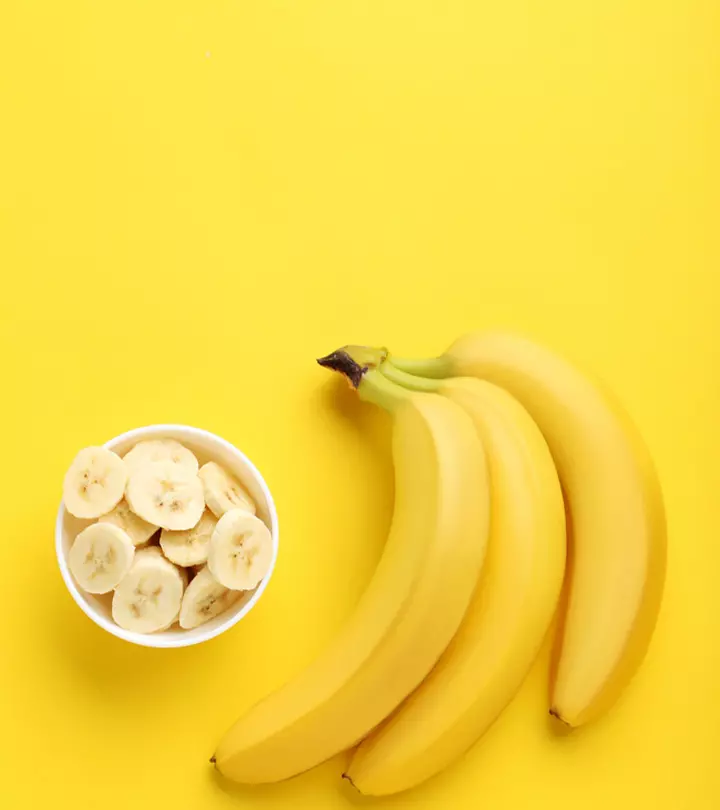
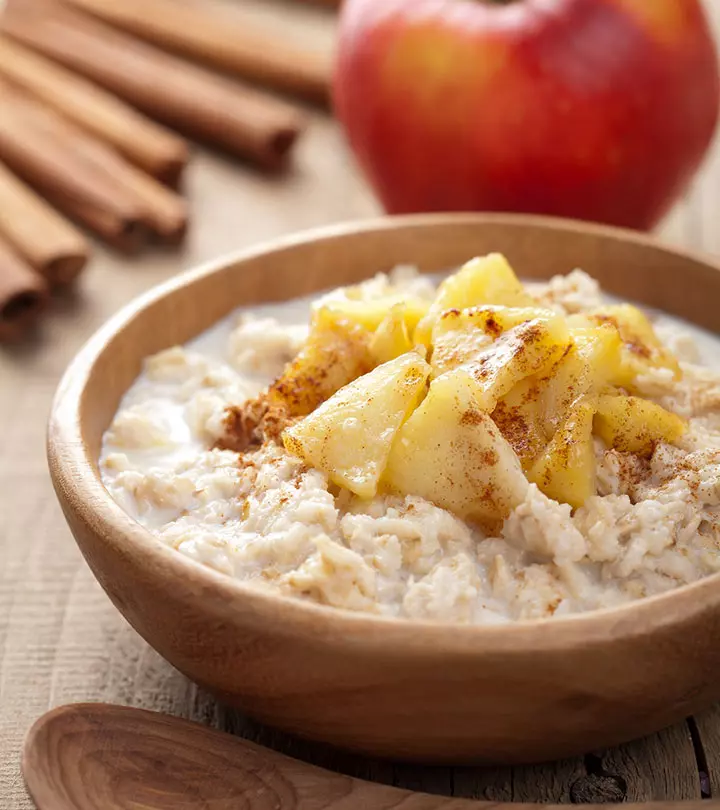


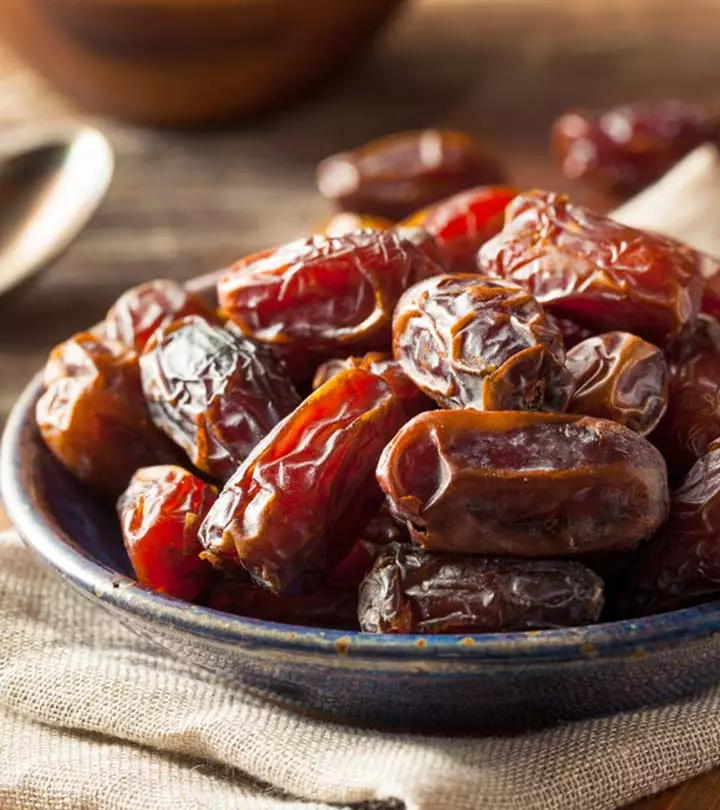












Community Experiences
Join the conversation and become a part of our empowering community! Share your stories, experiences, and insights to connect with other beauty, lifestyle, and health enthusiasts.